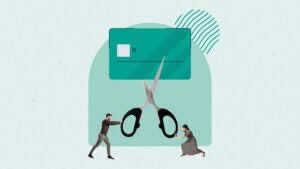Survey: Over half of mortgage, auto borrowers fret about their ability to pay

As the coronavirus hammers the American economy, most consumers with mortgages and auto loans fear they’ll miss payments in the next three months, according to a Bankrate survey. Yet 60 percent of those anxious borrowers have not reached out to their lenders to seek payment relief, a surprising finding that could spell still more trouble in the months ahead as the pandemic continues.
Among concerned consumers who hadn’t contacted their creditors, 34 percent of mortgage borrowers and 43 percent of auto loan borrowers surveyed said they didn’t know communicating a financial hardship was an option, hadn’t gotten around to it or were waiting for the lender to reach out first.
The say-nothing strategy is the wrong approach, says Greg McBride, CFA, Bankrate’s chief financial analyst.
“For households struggling financially due to the pandemic, payment relief is available — but you have to ask for it,” McBride says. “Make this a top priority. Forbearance can ease the strain of what may well be two of the biggest components of the household budget.”
In a nationally representative sample, Bankrate polled 1,325 mortgage borrowers, including 720 who are worried about their ability to make payments in the next three months, and 1,221 borrowers with auto loans, including 666 who worry about making payments in the same timeframe.
Here are the survey’s key findings and what they mean for you.
Key takeaways:
- Just 40 percent of mortgage and auto borrowers concerned about making payments have contacted their lenders.
- Some 46 percent of mortgage borrowers with a college degree report some level of concern while 60 percent of those without a college degree are worried.
- Only 43 percent of baby boomers are concerned about their ability to make payments, followed by 56 percent of Generation X, 65 percent of older millennials (ages 31 to 39) and 79 percent of households age 30 or younger.
Varying levels of concern over making payments
More than 30 millions Americans have lost jobs as a result of the coronavirus pandemic, and the U.S. economy contracted by 4.8 percent in the first quarter of 2020. As a result of the sharp downturn, lenders have rolled out generous forbearance programs that let borrowers skip payments without penalty.
Overall, 54 percent of borrowers surveyed expressed concern about making payments, including 35 percent who are “somewhat” or “very” concerned. Some 20 percent of mortgage borrowers and 19 percent of auto borrowers report being only “slightly” concerned about their ability to make payments.
Among both mortgage borrowers and auto loan consumers, just 40 percent of concerned borrowers have contacted their lenders.
Borrowers report mixed results seeking payment relief
Among concerned mortgage borrowers, 17 percent have successfully received payment relief, 8 percent have a request in progress, 10 percent were unsuccessful and 5 percent have tried but been unable to reach someone or submit their request.
Among concerned auto borrowers, the results were similar – 18 percent were successful, 8 percent are in progress, 9 percent were unsuccessful and 5 percent were unable to reach anyone at the lender.
Boomers less concerned with loan payments than younger people
Borrowers with lower levels of concern also are less likely to have reached out to their lenders. These borrowers skew toward Generation X, baby boomers and consumers with higher levels of education.
Those most concerned with making their monthly payments tend to be younger, lack a college education or have children.
Among mortgage borrowers, 46 percent of those with a college degree report some level of concern while 60 percent of those without a college degree are worried. Fully 65 percent of parents with children under 18 are concerned.
Levels of concern rise dramatically among younger generations. Among mortgage borrowers, only 43 percent of baby boomers (Americans ages 56 to 74) are concerned, followed by 56 percent of Generation X (ages 40 to 55), 65 percent of older millennials (ages 31 to 39) and 79 percent of households age 30 or younger.
Bankrate’s survey found that the most anxious consumers also were the most likely to have communicated with their creditors.
“Fortunately,” McBride says, “those most concerned about making mortgage or car payments are more likely to have reached out to their lenders, particularly borrowers under age 40 and parents with children under age 18.”
What to do if you’re worried about making loan payments
Lenders are working with borrowers who are struggling, but their programs require you to take the initiative. Steps to take now include:
- Contact your lender and ask for help. If you are unable to make an upcoming payment on a mortgage or another type of loan, experts suggest reaching out to your lender immediately to talk over your options. Your creditor might be able to help you sign up for up to 12 months of paused payments, or perhaps waive late fees or move your payment deadline.
- Consider refinancing. If you still have an income and meet other qualification requirements, it’s possible that you could refinance your mortgage, a personal loan or another loan product you have into a new loan with an extended payment timeline and lower monthly payment. Interest rates have plummeted, so this could be a good option if you can qualify.
- Cut discretionary spending. Take a hard look at your spending and see if there are places to cut. In times of financial hardship, it can make sense to trim restaurant dining (carry-out qualifies as restaurant dining), cancel subscriptions you don’t use and otherwise find ways to spend less in your daily life.
- Consider selling the asset. This is a last resort and may leave you with a balance to be paid off, so proceed cautiously.
Methodology
Bankrate.com conducted this survey via online interview on YouGov. Interviews were conducted April 20-23, 2020, among 4,026 adults. Data are weighted and are intended to be representative of all U.S. adults, and therefore are subject to statistical errors typically associated with sample-based information.
Learn more:
- What to do if you can’t pay your bills during coronavirus
- Mortgage lenders offer help to borrowers hurt by coronavirus
- How to get a loan with bad credit
Why we ask for feedback Your feedback helps us improve our content and services. It takes less than a minute to complete.
Your responses are anonymous and will only be used for improving our website.





